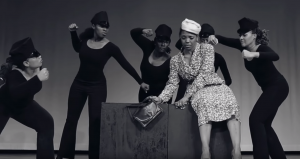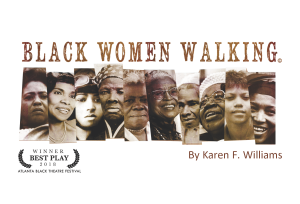Estrella Mountain Community College is delighted to celebrate Women’s History Month by bringing Black Women Walking to the Performing Arts Center March 30. The award-winning, one-act play brings Harriet Tubman, Sojourner Truth, Marian Anderson, Wilma Rudolph, Bessie Coleman, Willie Mae Ford Smith, Fannie Lou Hamer, and others to life. These courageous Black heroines changed the course of American history.
The play — written by Karen F. Williams, writer, editor, and author with a diversified career in journalism and publishing — is seen through the eyes of three elderly women. By coming together and sharing the stories of these great women of history, they too become liberated and empowered. They stand tall, move with faith, and step out with courage, despite the limitations and frailties of their age.
Producers say the play proves that the power of Black women can only fully be realized and acknowledged in the present by looking back and embracing and celebrating the past.
“Black Women Walking educates, entertains, and encourages. It is a spiritual-based play with universal themes about the importance of education, civil rights, liberation, justice, and equality,” Director Kevvin Taylor said.
Taylor is an award-winning theater producer/director and Broadway League Fellow (ASU Gammage) who graduated from the Herberger Institute School of Theatre and Film at Arizona State University.
He said Black Women Walking is a classic tale of finding strength in the struggle.
“The show is layered with soul-stirring songs, interpretive dance, and dramatic multimedia imagery. It is appropriate for all ages, and has a message for everyone,” Taylor said. “It gives parents the opportunity to share a positive learning experience with their children, and gives educators a tool for teaching important lessons of history, diversity, and social interaction.”
Who are the Black Women Walking?
Sojourner Truth — An African American abolitionist and women’s rights activist who traveled the country preaching and helping Africans who had been freed from slavery.
Harriet Tubman — Called Moses by those she helped to escape, Tubman was an instrumental part of the Underground Railroad, worked as a spy during the Civil war, and made 19 missions to free captives.
Mary Mcleod Bethune — A teacher considered one of the greatest educators in the United States and a powerful champion of racial equality.
Zora Neale Hurston — An American writer who found fame during the Harlem Renaissance. Her most famous novel was “Their Eyes Were Watching God.”
Bessie Coleman — A pioneering aviator who fought the odds and became the world’s first African American pilot.
Marian Anderson — An opera singer well known for her operatic voice and her moving spirituals. Fighting racism her whole life, Anderson was honored with many prestigious awards.
Willie Mae Ford Smith — Also known as Mother Willie Mae Ford Smith, she was one of the most legendary gospel vocalists of her time. Mother Smith was one of the early associates of Thomas A. Dorsey and an innovator in gospel, introducing the “song and sermonette” style.
Sister Elizabeth — “Old Elizabeth” was the first African American woman to preach in 1808.
Fannie Lou Hamer — was an American voting and women's rights activist, community organizer, and a leader in the civil rights movement. She was the co-founder and vice-chair of the Freedom Democratic Party, which she represented at the 1964 Democratic National Convention. Hamer also organized Mississippi's Freedom Summer along with the Student Nonviolent Coordinating Committee (SNCC).
Rosa Parks — Though she became famous for refusing to give up her seat on a bus an action helped spark the Montgomery Bus Boycott, Mrs. Parks was an active civil and women’s rights activist long before the boycott. Twelve years before that fateful commute, Mrs. Parks worked on criminal justice and its application in Alabama communities. In particular, she advocated for justice for Black women who were sexually assaulted by whites and protecting Black men from false accussations that often led to lynchings.
Wilma Rudolph — An athlete who became the first African American woman to win three gold medals in the Olympics. Rudolph became one of the most celebrated female athletes of all times.
“These women are warriors and survivors,” said Dr. Neal A. Lester, Director, Arizona State University Project Humanities. “Theirs is a story that needs to be told.”
The show won Best Play at the 2018 Atlanta Black Theatre Festival.
"Black Women Walking overwhelmed our audiences with a masterful combination of movement and digital storytelling that ended in a thunderous ovation,” said Toni Simmons Henson, Producing Director Atlanta Black Theatre Festival. “There's no wonder it won the coveted Festival Favorite Award for Best Play.”
Black Women Walking takes the stage at 7:30 p.m. March 30. Tickets, which can be purchased at www.bwwemcc.eventbrite.com, cost $20 for general admission and $10 for students with ID. Tickets cost $25 at the door.
Following the performance is a short discussion about the play’s themes and messages involving the cast, audience, and director.
EMCC is at 3000 N. Dysart Road, Avondale.

